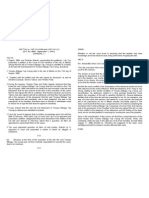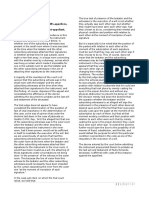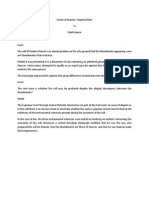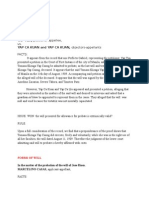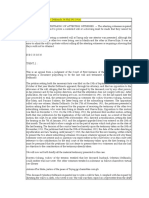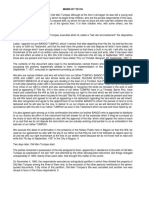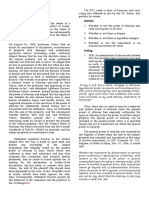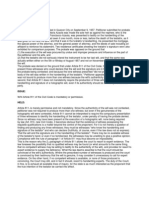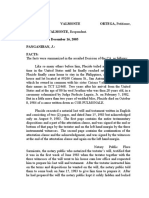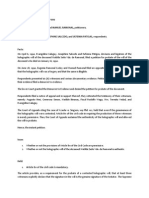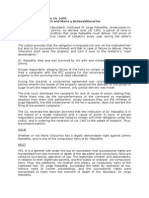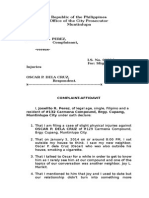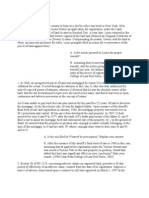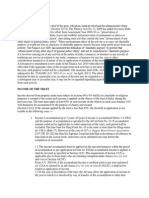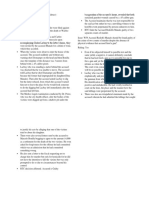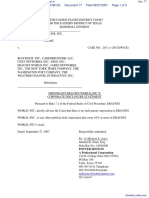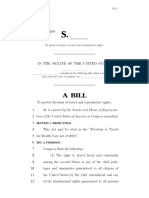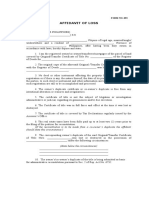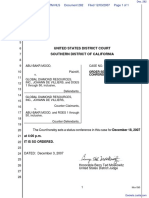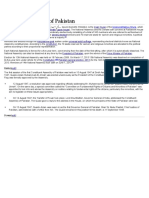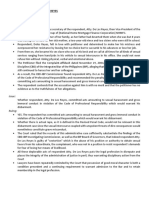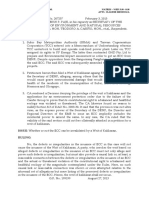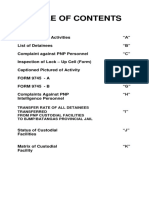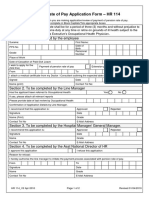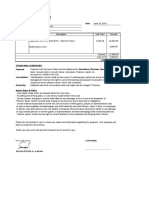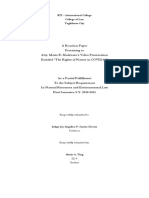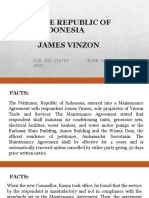Yap Tua V Yap CA Kuan
Yap Tua V Yap CA Kuan
Uploaded by
Casey IbascoCopyright:
Available Formats
Yap Tua V Yap CA Kuan
Yap Tua V Yap CA Kuan
Uploaded by
Casey IbascoOriginal Description:
Original Title
Copyright
Available Formats
Share this document
Did you find this document useful?
Is this content inappropriate?
Copyright:
Available Formats
Yap Tua V Yap CA Kuan
Yap Tua V Yap CA Kuan
Uploaded by
Casey IbascoCopyright:
Available Formats
5. YAP TUA VS.
YAP CA KUAN
FACTS:
Tomasa Elizaga Yap Caong executed a will before she died on August 11, 1909. The
will was signed by Anselmo Zacarias, Severo Tabora, and Timoteo Paez as witnesses. Yap Tua
presented a petition for the probate of the will. Then Yap Ca Kuan and Yap Ca Llu presented a
petition that they were interested in the matters of the will and asked for guardian ad litem to
represent them. Gabriel La O was appointed as guardian ad litem. They averred that the
signature in the will was obtained through fraud and undue influence and that Tomasa executed
another will on August 6, 1909 with all the formalities required by law.
During the rehearing, the court found that a preponderance of evidence showed that no
undue influence had been used and that at the time the will was presented to Tomasa for her
signature, she was of sound mind and memory and asked for a pen and ink and kept the will in
her possession for 10 or 15 minutes and finally signed it.
ISSUE:
Whether or not the name Tomasa is considered as her signature.
RULING:
Yes. Several witnesses testified that they saw her write the name "Tomasa." One of the
witnesses testified that she had written her full name. We are of the opinion, and we think the
law sustains our conclusion, that if Tomasa Elizaga Yap Caong signed any portion of her name
tot he will, with the intention to sign the same, that the will amount to a signature. It has been
held time and time again that one who makes a will may sign the same by using a mark, the
name having been written by others. If writing a mark simply upon a will is sufficient indication
of the intention of the person to make and execute a will, then certainly the writing of a portion
or all of her name ought to be accepted as a clear indication of her intention to execute the will.
*Additional:
Issue: Whether or not failure to revoke a former will is tantamount to the ineffectiveness of the
new will
Ruling: No. There appears to be but little doubt that Tomasa Elizaga Yap Caong did execute the
will of August 6, 1909. Several witnesses testified to that fact. The mere fact, however, that she
executed a former will is no proof that she did not execute a later will. She had a perfect right, by
will, to dispose of her property, in accordance with the provisions of law, up to the very last of
moment her life. She had a perfect right to change, alter, modify or revoke any and all of her
former wills and to make a new one. Neither will the fact that the new will fails to expressly
revoke all former wills, in any way sustain the charge that she did not make the new will.
You might also like
- YAP TUA, Petitioner-Appellee, vs. YAP CA KUAN and YAP CA KUAN, Objectors-Appellants. G.R. No. 6845 September 1, 1914Document2 pagesYAP TUA, Petitioner-Appellee, vs. YAP CA KUAN and YAP CA KUAN, Objectors-Appellants. G.R. No. 6845 September 1, 1914Bluebells33No ratings yet
- Yap Tua Vs Yap CA Kuan and Yap CA LluDocument2 pagesYap Tua Vs Yap CA Kuan and Yap CA LluKazper BermejoNo ratings yet
- Acop Vs PirasoDocument5 pagesAcop Vs PirasoEdward Kenneth KungNo ratings yet
- Petitioner-Appellee Vs Vs Objectors-Appellants Chicote & Miranda O'Brien & DewittDocument8 pagesPetitioner-Appellee Vs Vs Objectors-Appellants Chicote & Miranda O'Brien & DewittRestine Joy ArmadaNo ratings yet
- Yap Tua Vs Yap CA KuanDocument1 pageYap Tua Vs Yap CA KuanKate PunzalanNo ratings yet
- G.R. No. 5971 BEATRIZ NERA, ET AL., Plaintiffs-Appellees, vs. NARCISA RIMANDO, Defendant-AppellantDocument26 pagesG.R. No. 5971 BEATRIZ NERA, ET AL., Plaintiffs-Appellees, vs. NARCISA RIMANDO, Defendant-AppellantJan PriorNo ratings yet
- TUA VS CA GR No 6845 1914-09-01Document8 pagesTUA VS CA GR No 6845 1914-09-01Camille CastilloNo ratings yet
- Yap vs. YapDocument8 pagesYap vs. YapAnna BautistaNo ratings yet
- G.R. No. 6845Document9 pagesG.R. No. 6845Randy LorenzanaNo ratings yet
- Yap Tua V Yap CA KuanDocument2 pagesYap Tua V Yap CA KuanGillian CalpitoNo ratings yet
- Wills DigestsDocument5 pagesWills DigestsPhoebe SantillanNo ratings yet
- II - Testamentary SuccessionDocument11 pagesII - Testamentary SuccessionRoy DaguioNo ratings yet
- Yap Tua Vs Yap Ka KuanDocument6 pagesYap Tua Vs Yap Ka KuanKaren RonquilloNo ratings yet
- YAP TUA VsDocument2 pagesYAP TUA VsPantas DiwaNo ratings yet
- Yap Tua Vs Yap CA KuanDocument1 pageYap Tua Vs Yap CA KuanGlen VillanuevaNo ratings yet
- Cases To DigestDocument127 pagesCases To DigestJayhze DizonNo ratings yet
- Garcia v. La Cuesta Et Al DigestsDocument14 pagesGarcia v. La Cuesta Et Al DigestsakaibengoshiNo ratings yet
- Civil Code Rules For Filiation: Ung Portion Nia BinentaDocument6 pagesCivil Code Rules For Filiation: Ung Portion Nia BinentaGerald Bowe ResuelloNo ratings yet
- Notarial Wills Case Digest Incomplete v1.2Document32 pagesNotarial Wills Case Digest Incomplete v1.2Donvidachiye Liwag CenaNo ratings yet
- Digest Dolar Vs Diancin, Abada Vs Abaja, Tua Vs KuanDocument4 pagesDigest Dolar Vs Diancin, Abada Vs Abaja, Tua Vs KuanKevin Cruz DomingoNo ratings yet
- Succession - Notarial Wills Legacies and Devises DigestDocument333 pagesSuccession - Notarial Wills Legacies and Devises DigestCrystalAlfonso-SiguenzaNo ratings yet
- Notarial Wills Case Digest Incomplete v12 PDF FreeDocument32 pagesNotarial Wills Case Digest Incomplete v12 PDF Freepaul carmelo esparagozaNo ratings yet
- Art. 810 819 CASESDocument5 pagesArt. 810 819 CASESAngelica CrisostomoNo ratings yet
- Succession Digest SentDocument12 pagesSuccession Digest SentNicoRecintoNo ratings yet
- Cabang V DelfinadoDocument6 pagesCabang V DelfinadoLuz Celine CabadingNo ratings yet
- Mang-Oy Vs CaDocument4 pagesMang-Oy Vs CaRustom IbanezNo ratings yet
- (G.R. No. 2586. January 19, 1906.) TOMAS GUISON, Petitioner-Appellant, v. MARIA CONCEPCION, RespondentDocument17 pages(G.R. No. 2586. January 19, 1906.) TOMAS GUISON, Petitioner-Appellant, v. MARIA CONCEPCION, RespondentSylver JanNo ratings yet
- Succession Cases4 DigestDocument11 pagesSuccession Cases4 DigestRover DiompocNo ratings yet
- Eugenia Ramonal Codoy V Evangeline CalugayDocument2 pagesEugenia Ramonal Codoy V Evangeline CalugayaphrodateeNo ratings yet
- 15 - Abaya vs. ZalameroDocument1 page15 - Abaya vs. ZalameroflormtejNo ratings yet
- Succession Case DigestDocument14 pagesSuccession Case DigestAbriNo ratings yet
- Mang-Oy v. CADocument2 pagesMang-Oy v. CAChariNo ratings yet
- G. Payad v. Tolentino FactsDocument2 pagesG. Payad v. Tolentino FactsLyndon OliverosNo ratings yet
- in Re Estate of The Deceased Gregorio Tolentino - WillsDocument2 pagesin Re Estate of The Deceased Gregorio Tolentino - WillsAndrea TiuNo ratings yet
- Codoy Vs CALUGAYDocument2 pagesCodoy Vs CALUGAYasis.rilleNo ratings yet
- Diaz V de Leon, 43 Phil 413Document11 pagesDiaz V de Leon, 43 Phil 413angelo6chingNo ratings yet
- Succession Dec 15 1Document14 pagesSuccession Dec 15 1Camille Kristine DionisioNo ratings yet
- Nera Vs Rimando: G.R. L-5971 February 27, 1911 Ponente: Carson, J.Document4 pagesNera Vs Rimando: G.R. L-5971 February 27, 1911 Ponente: Carson, J.Lyndon OliverosNo ratings yet
- Barut vs. Cabacungan - G.R. No. L-6285Document9 pagesBarut vs. Cabacungan - G.R. No. L-6285jdz1988No ratings yet
- Succession Case DigestDocument6 pagesSuccession Case DigestTreblif Adarojem0% (1)
- Case Digests Testamentary Capacity CompleteDocument16 pagesCase Digests Testamentary Capacity CompleteDonvidachiye Liwag CenaNo ratings yet
- Paul G. Gorrez For Petitioner. Mario D. Ortiz For Respondent Manuel B. LugayDocument59 pagesPaul G. Gorrez For Petitioner. Mario D. Ortiz For Respondent Manuel B. Lugaychubbykian175837No ratings yet
- Codoy Vs Calugay Case DigestDocument2 pagesCodoy Vs Calugay Case DigestdanielNo ratings yet
- Facts: G.R. No. 123486 August 12, 1999 Eugenia Ramonal Codoy, and Manuel RAMONAL, PetitionersDocument2 pagesFacts: G.R. No. 123486 August 12, 1999 Eugenia Ramonal Codoy, and Manuel RAMONAL, Petitionersfermo ii ramosNo ratings yet
- Part 1Document98 pagesPart 1Charm Divina LascotaNo ratings yet
- Gan V YapDocument1 pageGan V YapRL N DeiparineNo ratings yet
- Barut Vs Cabacungan G.R. No. L-6285 February 15, 1912Document3 pagesBarut Vs Cabacungan G.R. No. L-6285 February 15, 1912Gui PeNo ratings yet
- Veloso Vs Ca Facts: IssuesDocument7 pagesVeloso Vs Ca Facts: IssuesCatherine Cruz GomezNo ratings yet
- URIBE Wills Cases 2Document23 pagesURIBE Wills Cases 2Lean Manuel ParagasNo ratings yet
- SuccessionDocument23 pagesSuccessionLois DNo ratings yet
- Vda. de Jacob v. CA, G.R. No. 135216, 312 SCRA 772, 783 (1999)Document14 pagesVda. de Jacob v. CA, G.R. No. 135216, 312 SCRA 772, 783 (1999)Jose IbarraNo ratings yet
- Digest 838-844 SuccessionDocument8 pagesDigest 838-844 SuccessionJenifer PaglinawanNo ratings yet
- Azaola V Digest CasesDocument4 pagesAzaola V Digest CasesbebebaaNo ratings yet
- Leticia Valmonte ORTEGA, Petitioner, JOSEFINA C. VALMONTE, Respondent. G.R. No. 157451 December 16, 2005 Panganiban, J.: FactsDocument3 pagesLeticia Valmonte ORTEGA, Petitioner, JOSEFINA C. VALMONTE, Respondent. G.R. No. 157451 December 16, 2005 Panganiban, J.: FactsBluebells33No ratings yet
- Codoy v. CalugayDocument2 pagesCodoy v. CalugayMark Genesis Alvarez RojasNo ratings yet
- Succ - Gan vs. YapDocument4 pagesSucc - Gan vs. YapCheCheNo ratings yet
- Succession Law CasesDocument8 pagesSuccession Law Casesione salveronNo ratings yet
- Case 805upDocument6 pagesCase 805upMarcky MarionNo ratings yet
- Case Digest Codoy Vs CalugayDocument2 pagesCase Digest Codoy Vs CalugayMae Salino50% (2)
- C2. TaxpayersDocument48 pagesC2. TaxpayersCasey IbascoNo ratings yet
- RA 8042 As Amended by RA 10022Document18 pagesRA 8042 As Amended by RA 10022Casey IbascoNo ratings yet
- Bagunu V PiedadDocument7 pagesBagunu V PiedadCasey IbascoNo ratings yet
- Crim Pro Full CasesDocument92 pagesCrim Pro Full CasesCasey IbascoNo ratings yet
- Wills DigestsDocument4 pagesWills DigestsCasey IbascoNo ratings yet
- Republic of The Philippines Office of The City Prosecutor MuntinlupaDocument5 pagesRepublic of The Philippines Office of The City Prosecutor MuntinlupaCasey IbascoNo ratings yet
- Ja For RapeDocument4 pagesJa For RapeCasey IbascoNo ratings yet
- Ja For RapeDocument4 pagesJa For RapeCasey IbascoNo ratings yet
- LTD RevDocument10 pagesLTD RevCasey IbascoNo ratings yet
- Gopal: Income of The TrustDocument23 pagesGopal: Income of The TrustAshish ShahNo ratings yet
- Harassment Defined. - Work, Education or Training-Related SexualDocument2 pagesHarassment Defined. - Work, Education or Training-Related SexualElla CardenasNo ratings yet
- United States v. Edwin Almestica, 546 F.2d 524, 2d Cir. (1976)Document3 pagesUnited States v. Edwin Almestica, 546 F.2d 524, 2d Cir. (1976)Scribd Government DocsNo ratings yet
- Batch 5 Compilation FINALDocument48 pagesBatch 5 Compilation FINALMatthew WittNo ratings yet
- Petition Certiorari PDFDocument69 pagesPetition Certiorari PDFMakiAcedo100% (1)
- Beneficial Innovations, Inc. v. Blockdot, Inc. Et Al - Document No. 77Document2 pagesBeneficial Innovations, Inc. v. Blockdot, Inc. Et Al - Document No. 77Justia.comNo ratings yet
- Legal Forms - Application For Search Warrant, Cert., Joint AffidavitDocument4 pagesLegal Forms - Application For Search Warrant, Cert., Joint AffidavitjeyarelsiNo ratings yet
- GR 190112 2015 PDFDocument9 pagesGR 190112 2015 PDFAnonymous KgPX1oCfr100% (1)
- Case FileDocument11 pagesCase Filearyan lewisNo ratings yet
- Freedom To Travel For Health Care Act of 2022Document8 pagesFreedom To Travel For Health Care Act of 2022Alanna VagianosNo ratings yet
- DIGEST - Mapalo To LequinDocument3 pagesDIGEST - Mapalo To LequinJJ OhNo ratings yet
- B'charan Lal Sahu Vs Union of India & Anr On 9 October, 1987'Document3 pagesB'charan Lal Sahu Vs Union of India & Anr On 9 October, 1987'Top Notch WorldNo ratings yet
- Form No.92-Affidavit of LossDocument2 pagesForm No.92-Affidavit of LossMaica PinedaNo ratings yet
- In Re Francisco V CarreonDocument3 pagesIn Re Francisco V CarreonJohn YeungNo ratings yet
- C E R T I F I C A T E S (Editable-Forrest Cunningham)Document11 pagesC E R T I F I C A T E S (Editable-Forrest Cunningham)NELEN ALINSONORINNo ratings yet
- Pork Barrel ScamDocument4 pagesPork Barrel Scamsandra_espartero2000No ratings yet
- Sample Opposition To Motion For Summary JudgmentDocument6 pagesSample Opposition To Motion For Summary Judgmentklmsu1967% (3)
- Mood v. Global Diamond Res, Et Al - Document No. 282Document1 pageMood v. Global Diamond Res, Et Al - Document No. 282Justia.comNo ratings yet
- National Assembly of PakistanDocument15 pagesNational Assembly of PakistanSirajUlHaq0% (1)
- Aaa Vs Delos ReyesDocument1 pageAaa Vs Delos ReyesMythel SolisNo ratings yet
- North Sea Continental Shelf CasesDocument18 pagesNorth Sea Continental Shelf CasesNemzNo ratings yet
- 04 Environmental Law Case Digests - ALANZALONDocument7 pages04 Environmental Law Case Digests - ALANZALONAgnesReaM.AlanzalonNo ratings yet
- Transfer Rate of All Detainees Transferred From PNP Custodial Facilities To Bjmp/Batangas Provincial JailDocument16 pagesTransfer Rate of All Detainees Transferred From PNP Custodial Facilities To Bjmp/Batangas Provincial Jailvincent j dacayananNo ratings yet
- Pension Rate of Pay Application Form - HR 114: - Section 1. To Be Completed by The EmployeeDocument2 pagesPension Rate of Pay Application Form - HR 114: - Section 1. To Be Completed by The EmployeeLexNo ratings yet
- Amaysim Phil. Invoice PDFDocument1 pageAmaysim Phil. Invoice PDFAmia R SagaysayNo ratings yet
- Caminos v. People PDFDocument12 pagesCaminos v. People PDFChristina Frances DychiocoNo ratings yet
- TING Maderazo Reaction Paper FinalDocument7 pagesTING Maderazo Reaction Paper FinalAlexis TingNo ratings yet
- Bantolino vs. Coca-Cola Case DigestDocument1 pageBantolino vs. Coca-Cola Case DigestRin K100% (1)
- The Republic of Indonesia Vs VinzonDocument8 pagesThe Republic of Indonesia Vs VinzonRomeo Aaron Lumibao INo ratings yet
- Social Media and Freedom of Speech and Expression PDFDocument16 pagesSocial Media and Freedom of Speech and Expression PDFAkshat SinhaNo ratings yet





